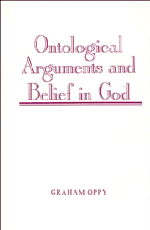Book contents
- Frontmatter
- Contents
- Preface
- Acknowledgments
- Ontological arguments and belief in God
- Introduction
- 1 Some historical considerations
- 2 Definitional arguments
- 3 Conceptual arguments
- 4 Modal arguments
- 5 Meinongian arguments
- 6 Experiential arguments
- 7 “Hegelian” arguments
- 8 Application to historical arguments
- 9 Are there (other) global objections to ontological arguments?
- 10 Is existence a predicate?
- 11 The uses of parody
- 12 Are ontological arguments of any use to theists and/or atheists?
- Conclusion
- Literature notes
- Bibliography
- Index
1 - Some historical considerations
Published online by Cambridge University Press: 05 May 2010
- Frontmatter
- Contents
- Preface
- Acknowledgments
- Ontological arguments and belief in God
- Introduction
- 1 Some historical considerations
- 2 Definitional arguments
- 3 Conceptual arguments
- 4 Modal arguments
- 5 Meinongian arguments
- 6 Experiential arguments
- 7 “Hegelian” arguments
- 8 Application to historical arguments
- 9 Are there (other) global objections to ontological arguments?
- 10 Is existence a predicate?
- 11 The uses of parody
- 12 Are ontological arguments of any use to theists and/or atheists?
- Conclusion
- Literature notes
- Bibliography
- Index
Summary
I begin with a synoptic history of ontological arguments. In the remaining part of this chapter, I shall discuss the works of some of the more prominent historical figures - St. Anselm, Descartes, Leibniz, Hume, and Kant - in more detail. Then, in the following chapters, I shall provide analyses of different kinds of ontological arguments, and show how these analyses relate to the historically important arguments.
HISTORICAL SYNOPSIS
Ontological arguments have been “found” in ancient Greek philosophy, in St. Augustine and other early Christians, and in the work of Jewish and Islamic philosophers prior to the eleventh century. However, it can be reasonably contended that the first clear statement of an ontological argument is that of St. Anselm, archbishop of Canterbury, in the eleventh century. St. Anselm's argument was much discussed throughout the succeeding centuries. Many prominent medieval thinkers accepted St. Anselm's argument – or modified versions of it – including Duns Scotus and St. Bonaventure. However, other significant medieval thinkers, including St. Thomas Aquinas and William of Occam, rejected the argument. One of the most important objections to St. Anselm's argument was provided by one of his contemporaries, the monk Gaunilo.
Ontological arguments received a fresh defense in the work of Descartes.
- Type
- Chapter
- Information
- Ontological Arguments and Belief in God , pp. 4 - 46Publisher: Cambridge University PressPrint publication year: 1996



